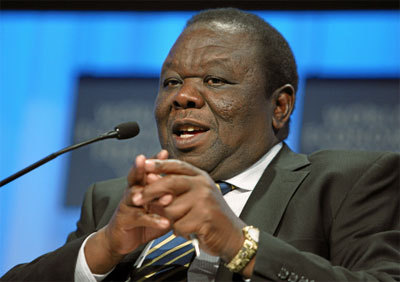Zimbabwean PM thaws up to Mugabe's demands on sanctions
The ball is now in the court of the countries that imposed targeted sanctions on Zimbabwe following the call of the Zimbabwean Prime Minister Morgan Tsvangirai that the measures should be lifted in recognition of progress made by the inclusive government since its formation last February.
|
|
Tsvangirai's Monday statement, although guarded, pointed out to a shift of positions with regards to the sanctions and acknowledged their effect on Zimbabwe's economic performance.
He said Zimbabwe should be rewarded for the progress it had made since the formation of the inclusive government and called on the countries that imposed sanctions to recognize the reforms that had taken place in the country.
Tsvangirai also reiterated that Zimbabweans on their own did not have the capacity to lift the sanctions. They had to turn to those who had imposed them, expecting them to recognize that the country needed assistance to forge ahead.
However, he also recognized the fact that Zimbabweans, especially those in the inclusive government, had a role to play in the lifting of the sanctions by meeting the benchmarks set by the sanction imposers in apparent reference to governance and human rights issues.
British Foreign Secretary David Miliband in January said that his country would only ease sanctions against Zimbabwe on advice from Tsvangirai's party, thus compromising his initial position that there were no wholesale sanctions against the country.
European Union (EU) member countries and the United States imposed sanctions on Zimbabwe at the turn of the century following a diplomatic row over Zimbabwe's controversial land reforms and governance issues.
The EU recently extended the sanctions for another year, citing lack of progress in implementing the provisions of a power-sharing agreement that led to the formation of the inclusive government, with Robert Mugabe remaining the president, Tsvangirai becoming the prime minister and Arthur Mutambara the deputy prime minister.
The power-sharing agreement, brokered as the Global Political Agreement (GPA) by then South African President Thabo Mbeki on behalf of the Southern African Development Community, saw the political parties represented in parliament and senate coming together to form the inclusive government.
However, Mugabe and Tsvangirai's parties have been squabbling over outstanding issues in the GPA, with Mugabe hammering on the sanctions issue while Tsvangirai wanting some official appointments to be nullified.
Under the GPA signed in September 2008, the parties acknowledged that some sections of the international community had since the year of 2000 imposed various sanctions and measures against Zimbabwe, which included targeted sanctions.
"The parties note the present economic and political isolation of Zimbabwe by the Britain, European Union, United States of America and other sections of the international community over and around issues of disputed elections, governance and differences over the land reform program," the GPA said.
It also noted that the Zimbabwe Democracy and Economic Recovery Act enacted by the United States Congress outlawed Zimbabwe's right to access credit from international financial institutions in which the US government was represented or had a stake.
This was in addition to the suspension of technical assistance by the International Monetary Fund, suspension of grants and infrastructural development support by The World Bank and the imposition of targeted travel bans against members of the then government and some business leaders.
The parties agreed therefore that all forms of measures and sanctions against Zimbabwe be lifted in order to facilitate a sustainable solution to the challenges facing the country and committed themselves to working together in re-engaging the international community with a view to bringing to an end the country's international isolation.
However, Tsvangirai and his party have generally referred to the sanctions as merely restrictive measures imposed on a section of the community and which should be lifted as that section met conditions set by those who had imposed them.
As a result, the differences between especially Mugabe and Tsvangirai's parties have continued to keep the inclusive government fragile, as Mugabe declared that his party would not make any further concessions to the GPA until the sanctions issues was addressed.
Tsvangirai's stance was also contrary to the positions of SADC facilitator and South African President Jacob Zuma, SADC itself and the African Union (AU).
Every SADC summit has called for the lifting of sanctions on Zimbabwe, while the AU, Common Market for Eastern and Southern Africa, Pan-African Parliament and the Non-Aligned Movement condemned the measures.
The EU continues to deny that it imposed wholesale sanctions on Zimbabwe, saying it partially suspended its government-to- government cooperation under the European Development Fund as a consequence of major disagreements issues of human rights, democratic principles, and the rule of law.
The EU said it adopted restrictive measures with regards to the prohibition of arms supply, travel bans and the freezing of assets against a number of persons or entities.
The Zimbabwean Parliament on Tuesday adopted a motion calling on Tsvangirai and Mutambara to engage Europe and the U.S. with a view to having the sanctions lifted.
Prior to its split into factions led by the two, the MDC had advocated for the imposition of sanctions on the then Zanu-PF government over governance and human rights issues.
Mutambara's party, however, has since acknowledged the existence of sanctions, together with some senior members of Tsvangirai's party.
 0
0 








Go to Forum >>0 Comments